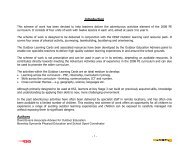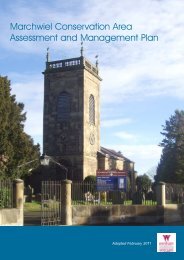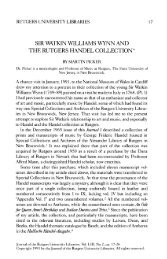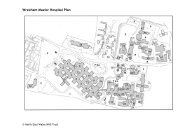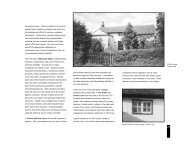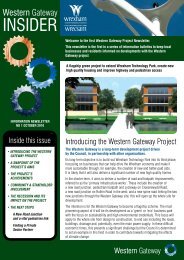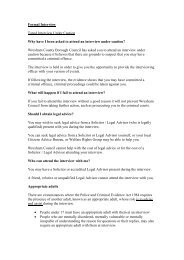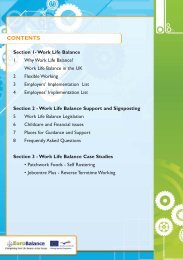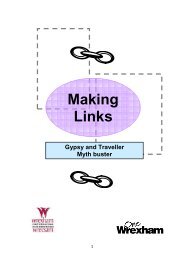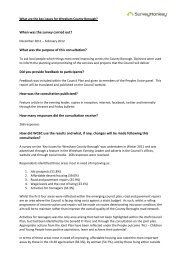Advice on Taking Your Own Legal Action - Wrexham County ...
Advice on Taking Your Own Legal Action - Wrexham County ...
Advice on Taking Your Own Legal Action - Wrexham County ...
Create successful ePaper yourself
Turn your PDF publications into a flip-book with our unique Google optimized e-Paper software.
INFORMATION LEAFLET –L22STATUTORY NUISANCEHOW TO TAKE A PRIVATE NUISANCE ACTION.<strong>Wrexham</strong> <strong>County</strong> Borough Council, Public Protecti<strong>on</strong> Service, Envir<strong>on</strong>mental Protecti<strong>on</strong> Secti<strong>on</strong> Teleph<strong>on</strong>e: 01978 298989Email: c<strong>on</strong>tact-us@wrexham.gov.ukWHAT IS A STATUTORY NUISANCE?A statutory nuisance is something that, under the Envir<strong>on</strong>mental Protecti<strong>on</strong> Act 1990, affects a pers<strong>on</strong>’shealth or causes disturbance to them in their property. Nuisance can broadly be defined as something thatunreas<strong>on</strong>ably affects somebody's use and enjoyment of their home and property.Noise is the most frequently complained of nuisance issue although there are other things that can bec<strong>on</strong>sidered as nuisances. These include smoke (e.g. from garden b<strong>on</strong>fires), dust, odour, and accumulati<strong>on</strong>s.The Envir<strong>on</strong>mental Protecti<strong>on</strong> Act 1990 lists other specific types of nuisance.Noise as a statutory nuisanceTo be a statutory nuisance a noise must occur regularly and c<strong>on</strong>tinue for a period of time that makesit unreas<strong>on</strong>able.The following are unlikely to be a statutory nuisance:• A <strong>on</strong>e-off party• Neighbours arguing• A lawnmower used during the day• A baby crying or dogs barking occasi<strong>on</strong>ally.The council has no c<strong>on</strong>trol over the following:• Road traffic/revving engines <strong>on</strong> the public highway• People shouting/laughing or screaming <strong>on</strong> a public road or footpath• Air traffic noiseSound levels (i.e. decibel levels (dB)) generally do not apply to statutory nuisance. Each case mustbe judged <strong>on</strong> its own merits and the following factors are c<strong>on</strong>sidered to help decide if the noise is anuisance:• the time of the noise (noise can be a nuisance at any time of day or night but is more likely tobe a nuisance at night)• the durati<strong>on</strong> of the noise (how l<strong>on</strong>g does it go <strong>on</strong> for when it happens?)• the frequency of the noise (how often does it happen?)• the type of noise (is it high pitched or does it have a particular characteristic)• the volume of the noise (quiet noise might be a nuisance if it c<strong>on</strong>tinues for l<strong>on</strong>g periods oftime)• is it ‘reas<strong>on</strong>able’ for the noise to be occurring when or where it is? (e.g. some<strong>on</strong>e living nearto an industrial estate cannot expect the same level of noise as some<strong>on</strong>e living in thecountryside).• is there societal acceptance of the noise? (eg fireworks are generally accepted aroundb<strong>on</strong>fire night or church bells accepted <strong>on</strong> a Sunday)1 of 9
In all assessments of nuisance the envir<strong>on</strong>mental health officer investigating the case, not the complainant,makes the decisi<strong>on</strong> <strong>on</strong> whether the noise is a nuisance. Case law requires the Officer to act as the ‘standardpers<strong>on</strong>’ when reaching the decisi<strong>on</strong>. Therefore, those who have a different or higher expectati<strong>on</strong> of peace,such as shift workers or people who are studying/ill, may not always get the result they want.WHY SHOULD I CONSIDER TAKING PRIVATE NUISANCE ACTION?To take acti<strong>on</strong> <strong>on</strong> your behalf the Envir<strong>on</strong>mental Protecti<strong>on</strong> Team must witness and experience the nuisanceyou are complaining about for themselves. They must also be satisfied that they have evidence to show to acourt that the disturbance is serious enough to be c<strong>on</strong>sidered a ‘statutory nuisance’ in a legal sense.The Council must take steps as are ‘reas<strong>on</strong>ably practicable’ to investigate a complaint and has no duty totake legal acti<strong>on</strong> unless it is satisfied that a nuisance exists. Whilst every effort is made to investigate anuisance, there are occasi<strong>on</strong>s when Officers do not witness the problem or fail to gather enough evidence todem<strong>on</strong>strate that it exists - for example, if the noise is irregular.In such cases it is possible for those affected by the nuisance to take their own private acti<strong>on</strong> directly to aMagistrates Court. This is d<strong>on</strong>e using exactly the same law used by Envir<strong>on</strong>mental Health Officers – theEnvir<strong>on</strong>mental Protecti<strong>on</strong> Act 1990, but uses a different secti<strong>on</strong> – Secti<strong>on</strong> 82.DO I NEED TO HAVE A SOLICITOR TO TAKE A PRIVATE ACTION?No. <strong>Taking</strong> your own private acti<strong>on</strong> is straightforward. The law is written so that members of the public canuse the court system to resolve to their problem. It need not be expensive and you do not need a solicitor.You may, however, wish to c<strong>on</strong>sult with a solicitor before taking legal acti<strong>on</strong>.HOW DO I BEGIN TO TAKE PRIVATE NUISANCE ACTION?You would be required to show the Court that you have attempted to resolve the problem yourself. To do thisyou should write to the pers<strong>on</strong> c<strong>on</strong>cerned and tell them that you believe they are causing a nuisance. Youshould tell them in the letter that if they do not do something to stop or reduce the nuisance themselves, thenyou will be c<strong>on</strong>sidering taking a private acti<strong>on</strong> under Secti<strong>on</strong> 82 of the Envir<strong>on</strong>mental Protecti<strong>on</strong> Act 1990.<strong>Your</strong> letter should state the reas<strong>on</strong> for your complaint – e.g. that nuisance is being caused by excessive dogbarking/playing of loud amplified music/smoke from b<strong>on</strong>fires. You should keep copies of all corresp<strong>on</strong>dencesent or received regarding your issue. An example letter is provided at the end of this leaflet.WHAT EVIDENCE DO I NEED?The letter you send is the first piece of evidence you will need to help persuade the court that you aresuffering from a statutory nuisance.Once you have sent the letter you should begin logging when the nuisance happens by writing down thedates and times <strong>on</strong> a simple diary m<strong>on</strong>itoring form (example provided). You should record <strong>on</strong> the form howthe nuisance affects you and why it is stopping you from enjoying your property – e.g. you cannot sleepbecause of the noise or you were not able to sit in the garden because of smoke from a fire.2 of 9
You may also wish to begin gathering other forms of evidence such as approaching others (e.g. friends orneighbours) who may have witnessed or experienced the problem themselves and would be willing to supportyou.Be careful, however, if you decide you want to record or video the nuisance. This type of evidence can bevery useful but to avoid any acti<strong>on</strong> being taken against you, you should ensure you have told the pers<strong>on</strong> youare recording that you may be gathering evidence in this way. You can advise them in your initial letter. If youdo take photographic or video evidence you should be sure to <strong>on</strong>ly take it of the nuisance occurring andnothing else or they may have a case against you for invasi<strong>on</strong> of privacy.D<strong>on</strong>’t forget – You must keep copies of all corresp<strong>on</strong>dence sent or received regarding your issue.WHAT DO I DO IF THE PROBLEM CONTINUES?If the pers<strong>on</strong> causing the problem chooses to ignore your letter to them and c<strong>on</strong>tinues with their acti<strong>on</strong> thenyou should write to them again and inform them that you will be applying to the Magistrates Court forproceedings to be taken. You must give them at least 3 days notice of your intenti<strong>on</strong> to do this. An exampleletter is provided with this leaflet. You must keep a copy of this notificati<strong>on</strong> for future reference.If the problem c<strong>on</strong>tinues then you should gather together all your evidence and c<strong>on</strong>tact the Justices Clerk at<strong>Wrexham</strong> Magistrates Court, Bodhyfryd, <strong>Wrexham</strong> (tel: 01978 310106).You will be required to visit the Court in pers<strong>on</strong> with your evidence. The Court is open weekdays from 9.30amand you should aim to visit around this time. You should go to the Clerk’s Office and explain that you want aSumm<strong>on</strong>s served under Secti<strong>on</strong> 82 of the Envir<strong>on</strong>mental Protecti<strong>on</strong> Act 1990. You should be prepared toproduce your evidence to show the Magistrates that you have an arguable case.If the Magistrates are satisfied that you have a case that should be answered, you will be given the time anddate of the hearing. The Court officers will serve the Summ<strong>on</strong>s requiring the defendant to turn up at Court atthat time to defend the case. A charge is made by the Court at the commencement of proceedings – youshould speak with the Court and ask what these charges are. After the Summ<strong>on</strong>s has been issued, youshould c<strong>on</strong>tinue to keep a record of evidence as described above which you can bring to the Court <strong>on</strong> thedate of the hearing.WHAT HAPPWNS AT COURT?On the date of the hearing you should arrive for the time allocated with your evidence and any witnesses youmay have. You will be required to explain to the Magistrates your side of the problem and will need to produceyour evidence to show when and how it occurs, and how it affects you. You, and your witnesses, will be crossexamined by the pers<strong>on</strong> you are accusing or by their legal representative.Going to Court is a serious matter and there is a high degree of court etiquette which you will be expected tofollow if you want to be taken seriously and have your problem c<strong>on</strong>sidered respectfully by the Magistrates.When attending court, you should bear in mind the following points. Arrive in good time for your case Be quiet until your case is called Be polite and courteous to the judge, to other court users and court officials Dress in a manner that suits the serious nature of the business c<strong>on</strong>ducted in court Do not attend court under the influence of drink or drugs3 of 9
Do not smoke, eat or drink in the courtroomDo not make audio or video recordings or take photographs in the courtroomDo not read in the courtroom, unless you are asked to do soYou should bear in mind at this point that, whilst it is not essential for you to have a solicitor, the defendantmay employ <strong>on</strong>e to defend the case. The defendant will have an opportunity to put forward their side of thecase, and you should be prepared for them to produce c<strong>on</strong>tradictory evidence to yours. You will havean opportunity to cross examine them.If at any time the defendant or their witnesses resort to shouting or swearing at you, you should remain calm.In this way you will gain a lot more respect for your problem.Once all evidence and arguments have been presented the Magistrates will retire and c<strong>on</strong>sider the factsbefore passing a judgement. If you win your case then the Court will make an order requiring the nuisance tobe abated and/or prohibit the recurrence of the nuisance. The Court also has the power, at the time the orderis made, to impose a fine <strong>on</strong> the defendant. If the order is ignored and the defendant c<strong>on</strong>tinues to cause anuisance, then you will need to return to the Court where a substantial fine may be imposed if you can againsatisfy the Magistrates that the nuisance is being allowed to c<strong>on</strong>tinue.HOW MUCH WILL TAKING PRIVATE ACTION COST ME?<strong>Taking</strong> private acti<strong>on</strong> under secti<strong>on</strong> 82 of the Envir<strong>on</strong>mental Protecti<strong>on</strong> Act 1990 can actually cost very littleand the <strong>on</strong>ly necessary charge is the fee imposed by the Court for the handling of your case.You can represent yourself and in the event that you win your case you may be able to recover any costs youmay have incurred during the process.If you do decide to use a solicitor, make sure that you understand the basis <strong>on</strong> which you are being charged(normally an hourly rate) if you do not qualify for legal aid.You should also bear in mind that you may be liable for your opp<strong>on</strong>ent’s costs if your acti<strong>on</strong> does notsucceed. This may be costly.A point to c<strong>on</strong>sider is that if you genuinely believe you are being caused a statutory nuisance then you shouldbe c<strong>on</strong>fident in winning the case. If you have any doubts then you should rec<strong>on</strong>sider that what you areexperiencing is probably not a nuisance in the legal sense.Home insurance policies can cover private legal acti<strong>on</strong>. This may be already written into your policy or it maybe possible to add it. You should speak directly with your insurance provider regarding this.4 of 9
ENVIRONMENTAL PROTECTION ACT 1990Secti<strong>on</strong> 82Summary proceedings by pers<strong>on</strong>s aggrieved by statutory nuisances(1) A magistrates' court may act under this secti<strong>on</strong> <strong>on</strong> a complaint made by any pers<strong>on</strong> <strong>on</strong> the ground that he isaggrieved by the existence of a statutory nuisance.(2) If the magistrates' court is satisfied that the alleged nuisance exists, or that although abated it is likely to recur<strong>on</strong> the same premises, the court shall make an order for either or both of the following purposes—(a) requiring the defendant to abate the nuisance, within a time specified in the order, and to execute any worksnecessary for that purpose;(b) prohibiting a recurrence of the nuisance, and requiring the defendant, within a time specified in the order, toexecute any works necessary to prevent the recurrence;and may also impose <strong>on</strong> the defendant a fine not exceeding level 5 <strong>on</strong> the standard scale.(3) If the magistrates' court is satisfied that the alleged nuisance exists and is such as, in the opini<strong>on</strong> of the court,to render premises unfit for human habitati<strong>on</strong>, an order under subsecti<strong>on</strong> (2) above may prohibit the use of thepremises for human habitati<strong>on</strong> until the premises are, to the satisfacti<strong>on</strong> of the court, rendered fit for that purpose.(4) Proceedings for an order under subsecti<strong>on</strong> (2) above shall be brought—(a) except in a case falling within paragraph (b) or (c) below, against the pers<strong>on</strong> resp<strong>on</strong>sible for the nuisance;(b) where the nuisance arises from any defect of a structural character, against the owner of the premises;(c) where the pers<strong>on</strong> resp<strong>on</strong>sible for the nuisance cannot be found, against the owner or occupier of thepremises.(5) Where more than <strong>on</strong>e pers<strong>on</strong> is resp<strong>on</strong>sible for a statutory nuisance, subsecti<strong>on</strong>s (1) to (4) above shall applyto each of those pers<strong>on</strong>s whether or not what any <strong>on</strong>e of them is resp<strong>on</strong>sible for would by itself amount to anuisance.(6) Before instituting proceedings for an order under subsecti<strong>on</strong> (2) above against any pers<strong>on</strong>, the pers<strong>on</strong>aggrieved by the nuisance shall give to that pers<strong>on</strong> such notice in writing of his intenti<strong>on</strong> to bring the proceedingsas is applicable to proceedings in respect of a nuisance of that descripti<strong>on</strong> and the notice shall specify the mattercomplained of.(7) The notice of the bringing of proceedings in respect of a statutory nuisance required by subsecti<strong>on</strong> (6) abovewhich is applicable is—(a) in the case of a nuisance falling within paragraph (g) of secti<strong>on</strong> 79(1) above, not less than three days' notice;and(b) in the case of a nuisance of any other descripti<strong>on</strong>, not less than twenty-<strong>on</strong>e days' notice;but the Secretary of State may, by order, provide that this subsecti<strong>on</strong> shall have effect as if such period as isspecified in the order were the minimum period of notice applicable to any descripti<strong>on</strong> of statutory nuisancespecified in the order.(8) A pers<strong>on</strong> who, without reas<strong>on</strong>able excuse, c<strong>on</strong>travenes any requirement or prohibiti<strong>on</strong> imposed by an orderunder subsecti<strong>on</strong> (2) above shall be guilty of an offence and liable <strong>on</strong> summary c<strong>on</strong>victi<strong>on</strong> to a fine not exceedinglevel 5 <strong>on</strong> the standard scale together with a further fine of an amount equal to <strong>on</strong>e-tenth of that level for each day<strong>on</strong> which the offence c<strong>on</strong>tinues after the c<strong>on</strong>victi<strong>on</strong>.(9) Subject to subsecti<strong>on</strong> (10) below, in any proceedings for an offence under subsecti<strong>on</strong> (8) above in respect of astatutory nuisance it shall be a defence to prove that the best practicable means were used to prevent, or tocounteract the effects of, the nuisance.(10) The defence under subsecti<strong>on</strong> (9) above is not available—(a) in the case of a nuisance falling within paragraph (a), (d), (e), (f) or (g) of secti<strong>on</strong> 79(1) above except wherethe nuisance arises <strong>on</strong> industrial, trade or business premises;(b) in the case of a nuisance falling within paragraph (b) of secti<strong>on</strong> 79(1) above except where the smoke isemitted from a chimney;(c) in the case of a nuisance falling within paragraph (c) or (h) of secti<strong>on</strong> 79(1) above; and5 of 9
(d) in the case of a nuisance which is such as to render the premises unfit for human habitati<strong>on</strong>.(11) If a pers<strong>on</strong> is c<strong>on</strong>victed of an offence under subsecti<strong>on</strong> (8) above, a magistrates' court may, after giving thelocal authority in whose area the nuisance has occurred an opportunity of being heard, direct the authority to doanything which the pers<strong>on</strong> c<strong>on</strong>victed was required to do by the order to which the c<strong>on</strong>victi<strong>on</strong> relates.(12) Where <strong>on</strong> the hearing of proceedings for an order under subsecti<strong>on</strong> (2) above it is proved that the allegednuisance existed at the date of the making of the complaint, then, whether or not at the date of the hearing it stillexists or is likely to recur, the court shall order the defendant (or defendants in such proporti<strong>on</strong>s as appears fairand reas<strong>on</strong>able) to pay to the pers<strong>on</strong> bringing the proceedings such amount as the court c<strong>on</strong>siders reas<strong>on</strong>ablysufficient to compensate him for any expenses properly incurred by him in the proceedings.(13) If it appears to the magistrates' court that neither the pers<strong>on</strong> resp<strong>on</strong>sible for the nuisance nor the owner oroccupier of the premises can be found the court may, after giving the local authority in whose area the nuisancehas occurred an opportunity of being heard, direct the authority to do anything which the court would haveordered that pers<strong>on</strong> to do.6 of 9
EXAMPLE LETTER TO PERSON CAUSING THE PROBLEMAddressee<strong>Your</strong> addressDear Neighbour, (state their name if you know it)For some time I have been disturbed by < type of problem – e.g. noise, smoke, dust etc > coming from your property. The problem is from < source of nuisance – e.g. your dog barking regularly while you are out / the regular fires in your garden / the sawing of wood etc. > I shall be grateful if you would cease this disturbance and inform you that if you do not I am prepared to take acti<strong>on</strong> under secti<strong>on</strong> 82 of the Envir<strong>on</strong>mental Protecti<strong>on</strong> Act 1990. I regret the necessity for this letter, but your acti<strong>on</strong>s are causing me c<strong>on</strong>siderable distressand discomfort. <strong>Your</strong>s sincerely <strong>Your</strong> name EXAMPLE LETTER NOTIFYING OF ACTION BEING TAKEN UNDER SECTION 82Addressee<strong>Your</strong> addressDear Neighbour, (state their name if you know it)I wrote to you <strong>on</strong> < insert date > and informed you that < insert details of problem > wascausing disturbance to me in my property. I asked if you would take acti<strong>on</strong> to stop thenuisance.It would seem that, despite this request, I c<strong>on</strong>tinue to be disturbed and so I must nowinform you that I have no alternative but to commence acti<strong>on</strong> under secti<strong>on</strong> 82 of theEnvir<strong>on</strong>mental Protecti<strong>on</strong> Act 1990. This letter is giving you three days notice of myintenti<strong>on</strong> to do this.<strong>Your</strong>s sincerely<strong>Your</strong> name7 of 9
Nuisance M<strong>on</strong>itoring Form(Please see reverse for advice <strong>on</strong> completing this form)Name and address of complainant:Teleph<strong>on</strong>e number:Address of property from which nuisance is emitted:Type of nuisance:Name of pers<strong>on</strong> resp<strong>on</strong>sible for nuisance (if known):DETAILED LOG OF OCCURENCES CONSIDERED TO BE CAUSING A NUISANCEDATESTARTTIMEFINISHTIMENATURE ANDDURATIONTYPE OF NUISANCE AND OTHERRELEVANT INFORMATIONHOW DOES THE NUISANCE AFFECTYOU?This record of nuisance incidents, signed by me, is true to the best of my knowledge and beliefand I submit it knowing that if it is tendered in evidence, I shall be liable for prosecuti<strong>on</strong> if Ihave wilfully stated in it anything which I know to be false or do not believe to be true.Signed:Dated:8 of 9
ADVICE ON COMPLETING NUISANCE MONITORING FORMThis form should not be used to record every occasi<strong>on</strong> that you are aware that the problem is happening. Youshould <strong>on</strong>ly use this form to record occasi<strong>on</strong>s when the problem is causing a nuisance to you in your property;i.e. – when the noise, smoke, odour etc is interfering with or seriously affecting your enjoyment of yourproperty, home, garden etc in a way that might be judged to be unreas<strong>on</strong>able.Please use a separate line for each occasi<strong>on</strong> that the nuisance occurs (see example given below).This form may be used as evidence in Court and care should be taken in completing it so as to give as accuratea descripti<strong>on</strong> as possible of each particular occurrence of the nuisance.Example completed formPlease be aware this form has been completed using a variety of complaint types to show how they might berecordedComplaint Reference number: WK/123456789Investigating Officer: A J<strong>on</strong>esName and address of complainant: Mr E Roberts, 2 Any Street, Anytown WX1 2YZTeleph<strong>on</strong>e number: 0123 456789Address of property from which nuisance is emitted: 3 Any Street, Anytown WX1 2YZType of nuisance: Dog barking, loud amplifiedmusic, b<strong>on</strong>fire smoke, loud tv etcName of pers<strong>on</strong> resp<strong>on</strong>sible for nuisance (if known):Dog owner, pub landlord, property owner, tenantetcDETAILED LOG OF OCCURENCES CONSIDERED TO BE CAUSING A NUISANCEDATESTARTTIMEFINISHTIMENATURE ANDDURATIONTYPE OF NUISANCE AND OTHERRELEVANT INFORMATIONHOW DOES THE NUISANCEAFFECT YOU?8/9/09 4.00am9/9/09 10.00am10/9/09 7.00pm11/9/09 2.00pm12/9/09 10.30am12/9/09 2.00pm13/9/09 7.00am5.00am12.30pm11.30pm4.00pm12.00pm4.00pm7.30amBarked every4-5 minsapproxC<strong>on</strong>tinuousC<strong>on</strong>tinuousall eveningRuns forapprox 10mins thenstops forapprox 5minsIntermittentC<strong>on</strong>tinuousLoud bursts of barking.Mostly several repeatedbarks with brief pausebetween.Smoke very thick and dark.Wind blowing directlytowards our houseLoud dance type musicFan dr<strong>on</strong>es when running,also has intermittentsqueaking noise.Fine layer of dust, noticed it<strong>on</strong> car and could see it in theair.Dust could be seen in air.Was causing thick layer <strong>on</strong>surfacesC<strong>on</strong>tinuous Fumes from exhaust –vehicle left running againthis morningWoken up. Stopped mefrom going back off tosleepHouse full of smoke.Had to go out to getaway from it.Couldn’t hear TV, hadto turn it up. Also,wanted early night butcouldn’t sleep until itstopped.Was in garden withfriend when noisestarted, disturbedc<strong>on</strong>versati<strong>on</strong>, had to goinside. Very sunnyday.Had to wash car andwindowsOnly washed car thismorning!Woke me up – this ismy day off! Had to getup when vehicle hadg<strong>on</strong>e and openwindows.This record of nuisance incidents, signed by me, is true to the best of my knowledge and belief and I submit it knowing that if it istendered in evidence, I shall be liable for prosecuti<strong>on</strong> if I have wilfully stated in it anything which I know to be false or do notbelieve to be true.Signed: E Roberts Dated: 4/9/099 of 9



